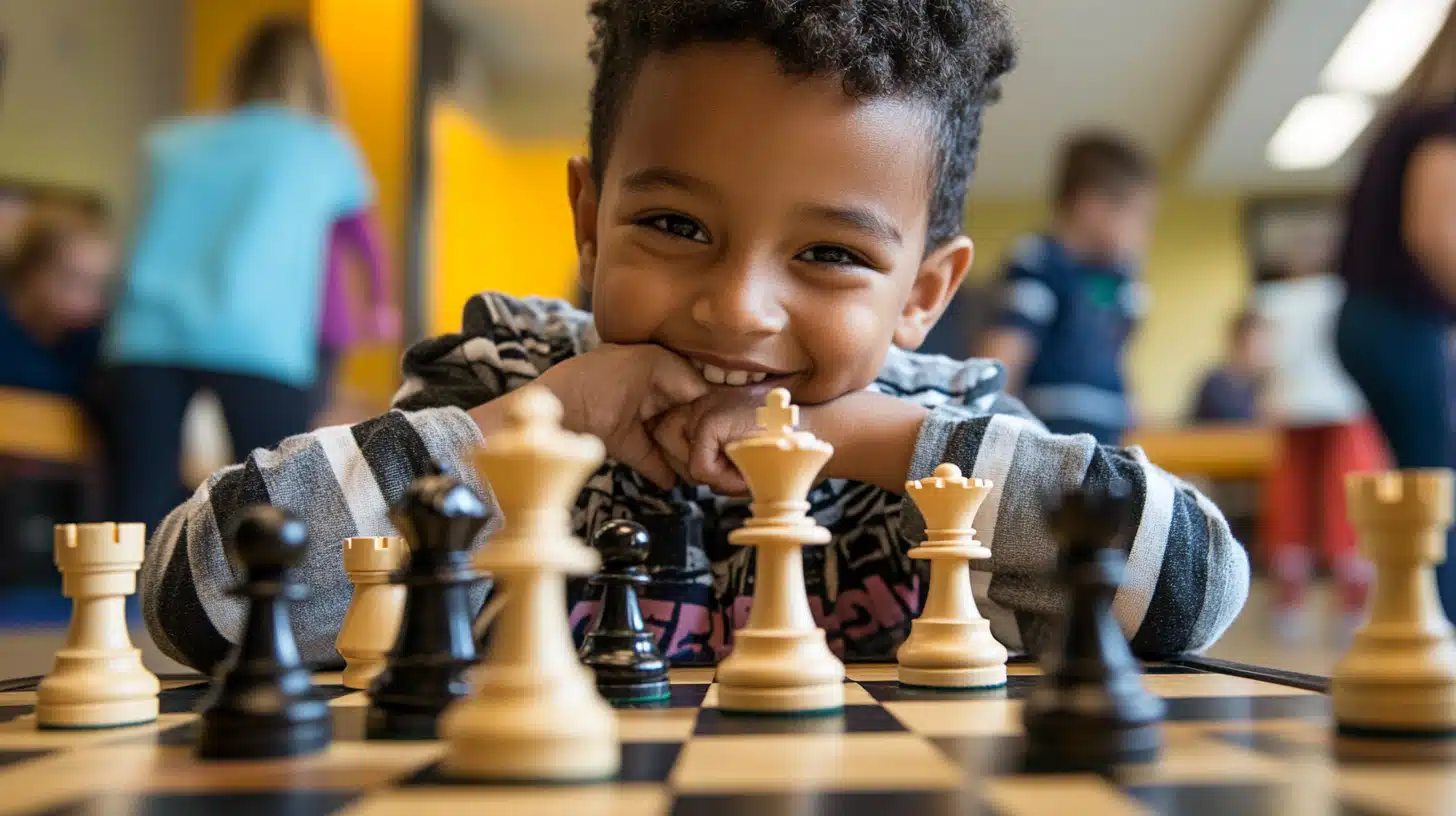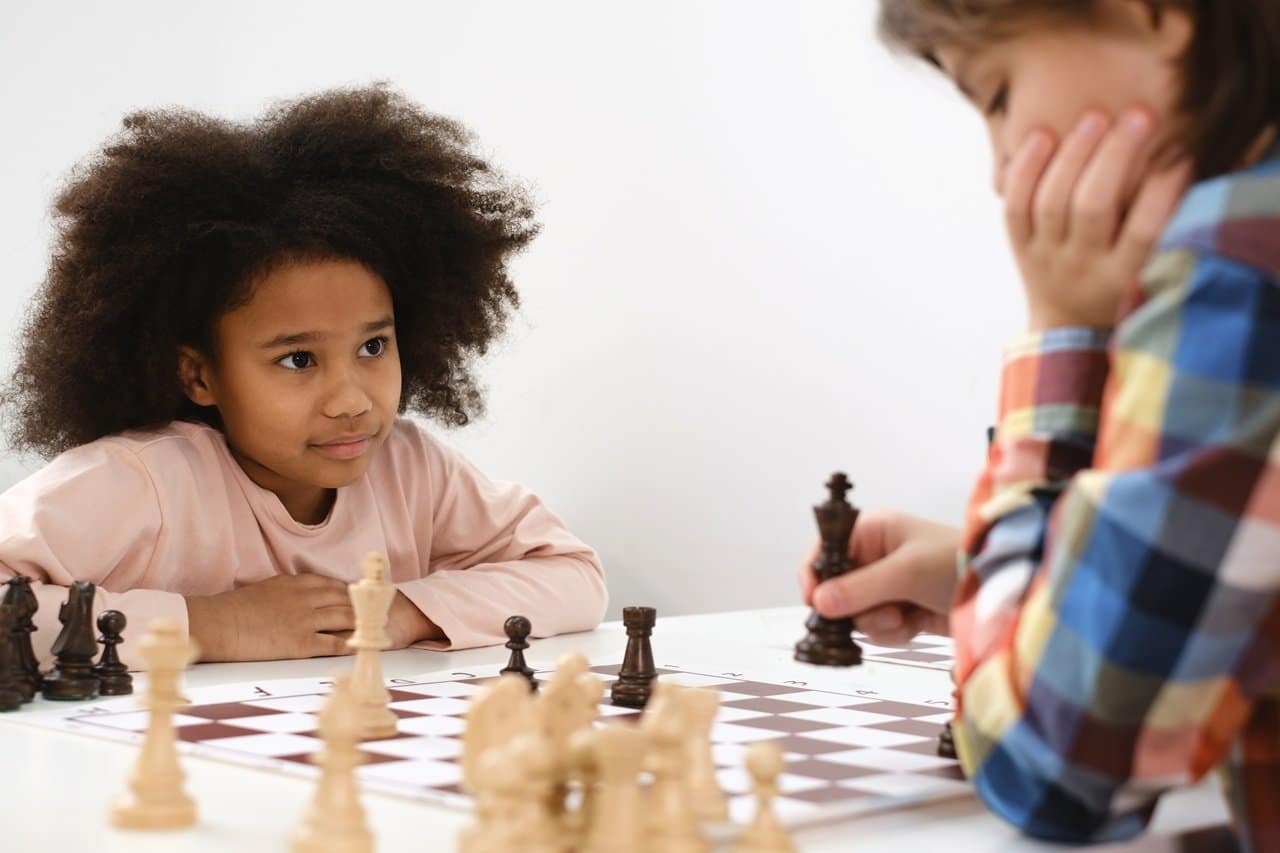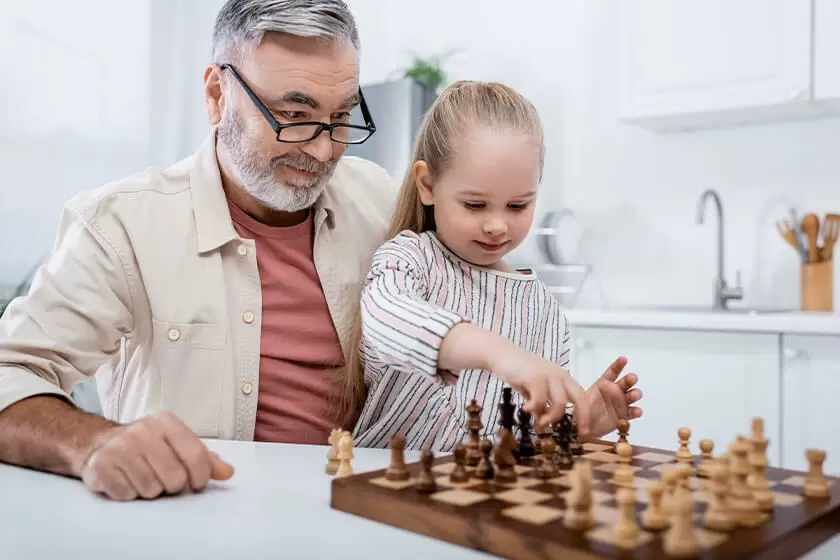
Every parent desires to provide their infant with an advantage in life. Although toys and gadgets may provide transient pleasure, chess provides a lifetime of advantages that are significantly more valuable. It is not merely a game; it is a developmental instrument that supports the development of children’s intelligence, confidence, and decision-making abilities. Let us explore five ways in which playing chess can have a positive impact on your child’s life.
1. Enhances the Ability to Solve Problems

In the game of chess, each move is significant. A child is required to exercise critical thinking, evaluate various alternatives, and identify the most effective approach to a problem. For instance, in the event that their monarch is under attack, they must promptly devise a strategy to safeguard it while simultaneously strategizing their subsequent course of action. Over time, this method of problem-solving becomes second nature.
Chess also enhances learning in the classroom.
Assume that your child is confronted with a complex mathematical query during their academic career. They will approach it as a conundrum, deconstructing it step by step until they discover the solution, thanks to chess. This perspective is not limited to academics; it is a life skill that is beneficial in a variety of contexts, including the management of alliances and the resolution of real-world issues.
2. Fosters Focus and Patience
Distractions are ubiquitous in the contemporary era. Children frequently succumb to the temptation to transition from one activity to another without completely participating in any of them. Chess instills concentration and perseverance.
In order to emerge victorious in a game, they must remain attentive, evaluate the board, and contemplate the repercussions of each decision. Chess naturally slows down players and encourages them to pay attention to details, as rushing can result in errors.
This ability can be applied in their daily lives. It will be simpler for them to maintain their concentration and complete assignments with precision, regardless of whether they are perusing a book or working on a school project. Additionally, they are less inclined to become irritated or give up when circumstances do not align with their expectations when patience becomes a habit.
3. Fosters Confidence
“There is something enchanting about witnessing an infant utter the word “Checkmate!” Their confidence is bolstered by the sense of accomplishment, regardless of whether they emerge victorious or execute a prudent maneuver. They begin to have confidence in their capabilities and comprehend that diligence is rewarded.
Chess instills resilience, regardless of the outcome. Rather than becoming disheartened, they will analyze the game to determine the areas in which they erred and how they can progress in the future. Their self-esteem is enhanced and their “can-do” attitude is fostered by overcoming obstacles and learning from their errors.
The confidence that is acquired through the game of chess is not retained on the board. It is evident in the form of class presentations, athletics, and even the formation of new friendships. Your child will experience an increased sense of confidence and preparedness to confront the obstacles of life.
4. Improves Decision-Making Capabilities

In chess, each move is a decision, and each decision has repercussions. In the event that your child moves a pawn without considering the consequences, they may forfeit a more valuable piece. This cause-and-effect process instructs them to meticulously assess their alternatives and contemplate the potential consequences.
Children begin to make more informed decisions as they engage in a greater number of games, not only on the chessboard but also in real life. Regardless of whether they are selecting how to allocate their pocket money, resolving a dispute with a companion, or planning their day, they will acquire the ability to contemplate their actions before taking them. One of the most practical skills they will ever acquire is the habit of making deliberate decisions.
Additionally, chess facilitates their comprehension of the significance of strategy. They will observe that modest, consistent endeavors—such as the early development of their units or the protection of their king—can result in significant victories in the future. This lesson is beneficial for the establishment and realization of long-term objectives, including the pursuit of interests and academic excellence.
5. Encourages emotional development
One of the most frequently disregarded advantages of chess is its ability to assist children in managing their emotions. While winning a game can be an incredible experience, it is also important to learn valuable lessons from the experience of failing. Your child will acquire the ability to manage disappointment, maintain composure in high-pressure situations, and persist in their endeavors, even when the going gets difficult.
For example, they may initially experience feelings of frustration if they lose a significant contest. However, they will eventually come to the realization that it is a chance to develop. They will acquire the ability to evaluate the reasons for their failures and apply this knowledge to enhance their performance. This type of resilience is a potent quality that enables children to remain resilient in the presence of adversity.
Additionally, chess fosters empathy. Children develop an appreciation for diverse perspectives and respect for their opponents when they engage in competitive activities. They will observe that each participant possesses their own strengths and weaknesses, which can encourage empathy and benevolence in their interactions with others.
How to Begin Your Child’s Chess Journey
No special abilities or equipment are necessary to introduce your child to chess.
Consider enrolling your child in an online chess academy such as GSChess.com. It’s one of the best online chess training academies out there.
Your child gets the benefits of access to the world’s best instructors from the comfort of their home. They even have a free chess trial class, if you’re interested.
They will maintain their motivation while rapidly developing their abilities with the assistance of engaging lessons and experienced coaches. Another effective method for fostering confidence and development is to participate in tournaments.
Wrapping it up
Chess is not merely a pastime. It is a potent instrument that molds the minds of young individuals, facilitating the development of critical thinking, emotional growth, and focus. By instructing your infant in the game of chess, you are imparting lifelong skills.
Why not commence today? A single game of chess has the potential to instill a passion for learning and development in your child, thereby altering their future.
